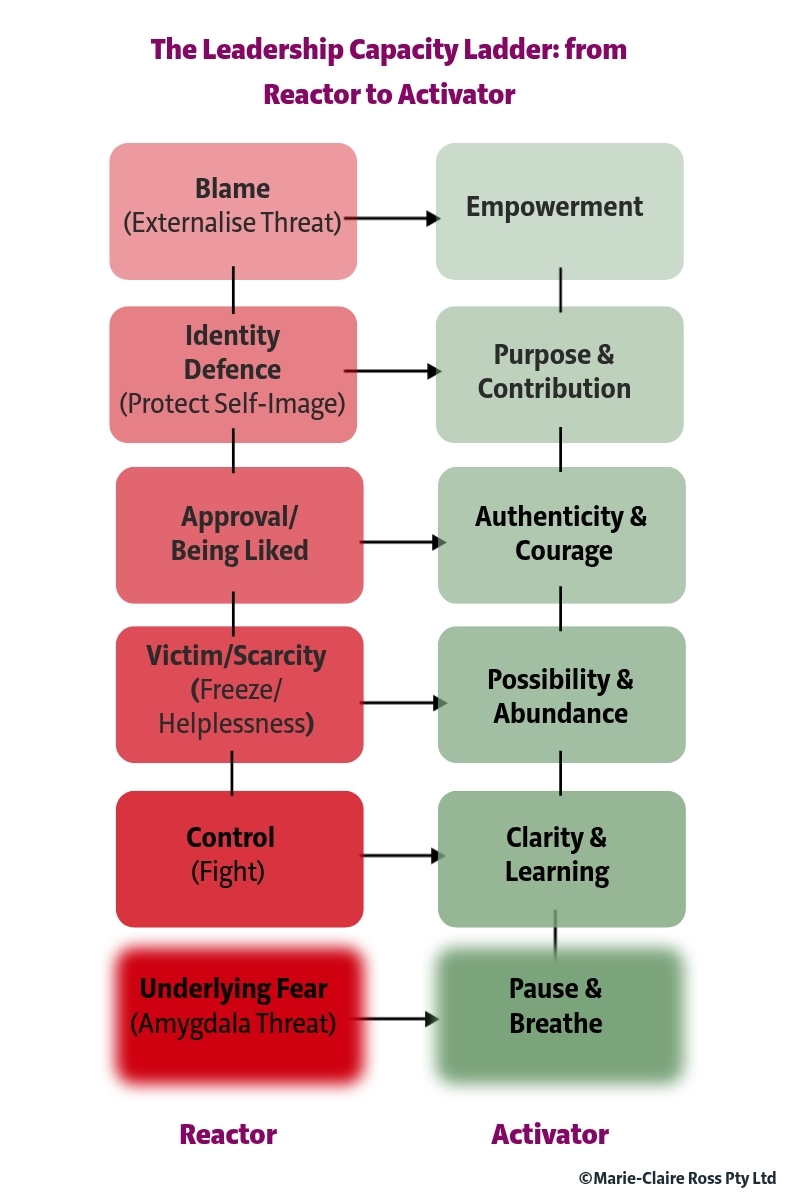5 min read
Why Great Leaders Thrive When Good Ones Fail During a Workplace Crisis
Implementing change in the workplace often creates pressure, uncertainty, and emotional reactions - especially during a workplace crisis. Successful...
Develop leaders, strengthen executive teams and gain deep insights with assessments designed to accelerate trust and performance.

Transform how your leaders think and perform with keynotes that spark connection, trust and high-performance cultures.

Explore practical tools, thought-leadership and resources to help you build trusted, high-performing teams.

Trustologie® is a leadership development consultancy founded by Marie-Claire Ross, specialising in helping executives and managers build high-trust, high-performing teams.

6 min read
Marie-Claire Ross : Updated on February 13, 2023

As we head into a new year with new goals and expectations, you might be finding that you are tasked with some stiff challenges with leading your team.
Perhaps you are leading a new team that is poor performing and your role is to turn around performance?
Maybe you have put together a new team and you need go through the process of norming and storming?
Or perhaps you are a new leader and you have recently been promoted as a team leader or manager?
With any sort of new change, it's fairly normal to experience self-doubt about your abilities. Self-doubt can be healthy. It can motivate us to learn more, be humble about our capabilities, acknowledge our weaknesses, encourage us to investigate issues, improve our relationships and seek more honest feedback from others.
On the other hand, self-doubt can be paralysing if we let our fears get out of control.
Let's take a look at nine things that you can do to ensure that your self-doubt is a positive motivator.
1. Make time to get clear - Often, when we get overwhelmed and doubt ourselves, it is because we have lost sight on what we need to achieve. As a busy manager, we are often jumping from one fire to the next. If we easily get sidetracked by the most demanding drama, we spread ourselves too thinly. Not only does this send the wrong messages to our team, but it often means that we aren't spending the time to improve our team's performance. Prioritising our time to know exactly what we, and our team, are responsible for is critical.
Schedule some do not disturb planning time to get really clear on your goals, your subtasks and your deadlines. If you have any confusion, seek clarity by asking your boss or a peer some questions to help you better understand the project at hand. This will help you better understand what needs to be done, how it needs to be done, your expectations and what resources you require for your team to succeed. This will also better help you better prioritise and communicate your employee's work so they also don't go into overwhelm.
2. Focus on meaning - Research shows that when we find our work meaningful, performance improves by 33% and the increased productivity amounts to as much as $10,000 per individual.
3. Schedule people management time - Leading your people doesn't happen on its own. You have to make time for it. This requires scheduling time each week with your team to improve performance. People management includes running one-on-ones, team meetings, delegating tasks, providing work directives and dealing with work issues.
Depending on your tasks and your leadership level, your people management time might be anywhere between 30-80% of your time. For example:
Project management - 40%
People management/work planning - 50%
Reporting and admin - 10%
This brings me to the next point.
4. Do more delegation - Being able to delegate more effectively initially requires increasing your people management time (so that you can reduce people management time in the future). Really understanding your role allows you to focus on the things that only you can do, so you can delegate other tasks amongst the team. Delegating shows you trust your team to get things done and can help develop their skills. It frees up your time to concentrate on where you can add the most value. It's also important for succession planning, so that team members are being increasingly trained up to respond to a range of situations.
At its core, delegation is all about communication. That is communicating clearly what needs to be done, how, and by when and to what standard. It can take some time to get this right with a new team. Make sure you are scaling up your level of delegation as you work with a new team to improve their capabilities. Doing delegation right means you are improving accountability in your team.
5. Collect employee feedback - As a leader we can often feel like we need to know all the answers. A lot of leaders will lock themselves away when they doubt themselves. The truth is a lot of the answers you need to improve performance are within your team. You just need to ask.
Ask your team members regular questions to unlock their collective intelligence, but also provide you with real time feedback on what needs to be done to improve work flow. Do it regularly and you will also remarkably increase team engagement.
At Cisco, they get managers to do weekly check ins with their direct reports. When they looked at the data of 2 million check ins they found that team member’s engagement scores shot up by 77% and their team members’ voluntary turnover in the following 6 months went down by 67%.
6. Get specific feedback from other leaders - When we are learning to grow our leadership, it is an ideal time to seek feedback from loving critics. People who aren’t afraid to tell the truth, but who are doing it from a place of compassion to help you be your best.
7. Talk to customers - If you are new to a company or job, it's really important to have discussions with customers to find out what they need.
This benefits you two-fold. First, it means you are really finding out what is going on in the marketplace, so they you get real-time information that is crucial to confidently refining the right strategies. It also means you find out what is bugging customers so that you can remove bottlenecks and untangle problems to help your team better manage customer expectations.
Successful companies make this a regular routine. Take Walmart. Each week, from Monday through to Thursday, leaders are out in the field visiting Walmart stores and their competitors. On Fridays, they report what they learned and executives read all of the quantitative data, as well as the qualitative intelligence.
Being able to successfully course correct and make reality based decisions is difficult when you’re not present to what is going on in the marketplace or even with your own employees. Schedule some time to talk to customers. This includes industry-based conversations (including talking to advisors) and noting customer observations.
8. Seek external support - Sometimes when we are levelling up to a new way of leading, external advice can help us see our blind spots and encourage us to try new things.
Consulting someone outside of your company can be beneficial such as a coach who can provide you with the confidence and tools you need to succeed. Mentoring groups are also beneficial where you are teamed up with others going through a similar journey. Consider a therapist if you find your levels of anxiety and self-doubt are taking over your thoughts.
9. Take time out - Working every day isn't a long term solution to improve our results. We do need to spend time refreshing ourselves. This means taking adequate breaks during our work day. The best type of break is being outside in nature for at least 15 minutes to reset us. Also, make sure you schedule time on your weekend to relax and catch up on sleep. Go out for lunch, go for a walk, do an activity that you love and spend time with friends and family.
Make sure you do activities that can take your mind off work. As it's usually those times, when we are least resistant, that any answers to our problems, magically appear.
Believing in ourselves requires taking the time to get clear on our priorities, plan what needs to be done and reaching out to others for advice. It means communicating more frequently with others and seeking feedback from a range of sources, so we are getting the information we need to confidently course-correct our approach.
As our competencies grow, so does our confidence. Creating a virtuous cycle where our confidence creates more confidence.
It also requires understanding that learning any new skill takes time. Have self-compassion for where you are and surround yourself with people who support and care about you. Celebrate the small wins and acknowledge any positive feedback you receive. And enjoy the journey.
If you are leading a new team, I am running a private mentoring group to help team leaders learn new skills with a group of similar people. You can find out more in my new free webinar: 3 Indispensable Secrets to Leading Thriving, Capable Teams.

5 min read
Implementing change in the workplace often creates pressure, uncertainty, and emotional reactions - especially during a workplace crisis. Successful...

7 min read
Navigating difficult conversations at work isn’t just a “nice to have” leadership skill – it’s the fault line that often separates healthy,...

8 min read
When my daughter was 17 months old, she discovered a superpower: the word “Why?”For the next two years, it was her response to almost everything.
.jpg)
In my post last week, I talked about how one of the hardest skills to manage as a leader is our ability to trust ourselves.
.jpg)
Back in 2014, I decided to step out of the family business I had built up with my husband and start my own company centred on trust (Trustologie®).

There comes a time for every manager when they have a direct report that they just don't know how to handle.